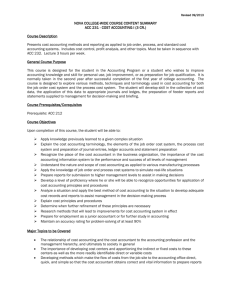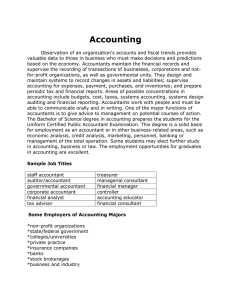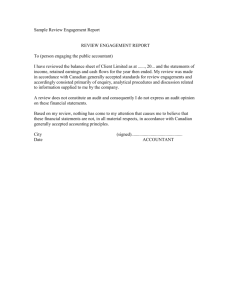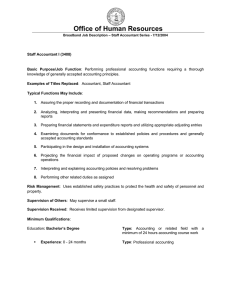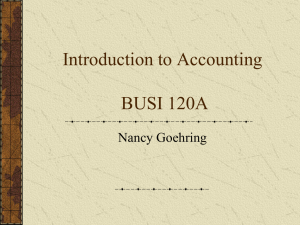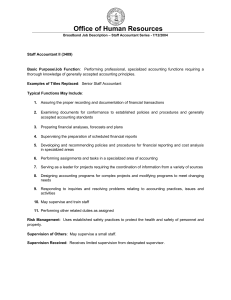Reports on Application of Requirements of an Applicable
advertisement
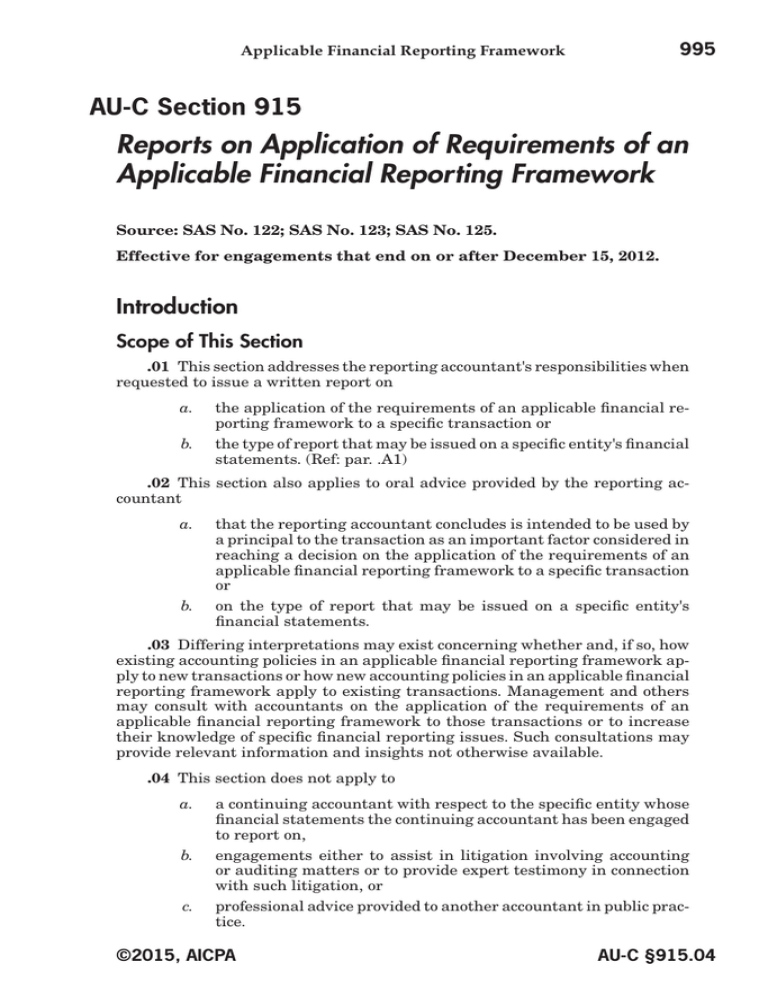
995 Applicable Financial Reporting Framework AU-C Section 915 Reports on Application of Requirements of an Applicable Financial Reporting Framework Source: SAS No. 122; SAS No. 123; SAS No. 125. Effective for engagements that end on or after December 15, 2012. Introduction Scope of This Section .01 This section addresses the reporting accountant's responsibilities when requested to issue a written report on a. the application of the requirements of an applicable financial reporting framework to a specific transaction or b. the type of report that may be issued on a specific entity's financial statements. (Ref: par. .A1) .02 This section also applies to oral advice provided by the reporting accountant a. that the reporting accountant concludes is intended to be used by a principal to the transaction as an important factor considered in reaching a decision on the application of the requirements of an applicable financial reporting framework to a specific transaction or b. on the type of report that may be issued on a specific entity's financial statements. .03 Differing interpretations may exist concerning whether and, if so, how existing accounting policies in an applicable financial reporting framework apply to new transactions or how new accounting policies in an applicable financial reporting framework apply to existing transactions. Management and others may consult with accountants on the application of the requirements of an applicable financial reporting framework to those transactions or to increase their knowledge of specific financial reporting issues. Such consultations may provide relevant information and insights not otherwise available. .04 This section does not apply to a. a continuing accountant with respect to the specific entity whose financial statements the continuing accountant has been engaged to report on, b. engagements either to assist in litigation involving accounting or auditing matters or to provide expert testimony in connection with such litigation, or c. professional advice provided to another accountant in public practice. ©2015, AICPA AU-C §915.04 996 Special Considerations in the United States .05 This section also does not apply to communications such as position papers prepared by an accountant for the purpose of presenting views on an issue involving the application of the requirements of an applicable financial reporting framework, provided that these communications are not intended to provide guidance on the application of these requirements to a specific transaction. Position papers include newsletters, articles, speeches, and texts thereof; lectures and other forms of public presentations; and letters for the public record to professional and governmental standards-setting bodies. Effective Date .06 This section is effective for engagements that end on or after December 15, 2012. Objective .07 The objective of the reporting accountant, when engaged to issue a written report or provide oral advice on the application of the requirements of an applicable financial reporting framework to a specific transaction or on the type of report that may be issued on a specific entity's financial statements, is to address appropriately a. b. c. the acceptance of the engagement. the planning and performance of the engagement. reporting on the specific transaction or type of report. Definitions .08 For purposes of this section, the following terms have the meanings attributed as follows: Continuing accountant. An accountant who has been engaged to report on the financial statements of a specific entity or entities of which the specific entity is a component. Hypothetical transaction. A transaction or financial reporting issue that does not involve facts or circumstances of a specific entity. Reporting accountant. An accountant, other than a continuing accountant, in public practice, as described in ET section 0.400, Definitions, who prepares a written report or provides oral advice on the application of the requirements of an applicable financial reporting framework to a specific transaction or on the type of report that may be issued on a specific entity's financial statements.[ 1] (A reporting accountant who is also engaged to provide accounting and reporting advice to a specific entity on a recurring basis is commonly referred to as an advisory accountant.) (Ref: par. .A4) Specific transaction. A completed or proposed transaction or group of related transactions or a financial reporting issue involving facts and circumstances of a specific entity. Written report. Any written communication that provides a conclusion on the appropriate application of the requirements of an applicable financial reporting framework to a specific transaction [ 1] [Footnote deleted, January 2015, to reflect conforming changes necessary due to the issuance of the revised AICPA Code of Professional Conduct, effective December 15, 2014.] AU-C §915.05 ©2015, AICPA Applicable Financial Reporting Framework 997 or on the type of report that may be issued on a specific entity's financial statements. [Revised, January 2015, to reflect conforming changes necessary due to the issuance of the revised AICPA Code of Professional Conduct, effective December 15, 2014.] Requirements Engagement Acceptance .09 In determining whether to accept the engagement, the reporting accountant should consider a. the circumstances under which the written report or oral advice is requested, b. the purpose of the request, and c. the intended use of the written report or oral advice. For purposes of this section, the reporting accountant is not required to be independent of the entity. .10 The reporting accountant should accept an engagement to issue a written report on the application of the requirements of an applicable financial reporting framework to a specific transaction only when the transaction involves facts or circumstances of a specific entity. The reporting accountant should not accept an engagement to issue a written report on hypothetical transactions. .11 If the reporting accountant has determined in accordance with paragraphs .09–.10 that it is appropriate to accept an engagement to be performed in accordance with this section, the reporting accountant should establish an understanding with the requesting party that a. responsibility for the proper accounting treatment rests with management, who is expected to consult with its continuing accountant; b. management acknowledges that the reporting accountant may need to consult with the continuing accountant and that, upon request, management will authorize the continuing accountant to respond fully to the reporting accountant's inquiries; and c. management will notify those charged with governance and the continuing accountant concerning the nature of the engagement. If management refuses to agree to authorize the continuing accountant to respond fully to the reporting accountant's inquiries, the reporting accountant should inquire about the reasons and consider the implications of that refusal when determining whether to accept the engagement. Engagement Planning and Performance .12 The reporting accountant should a. b. c. obtain an understanding of the form and substance of the specific transaction(s) or the conditions relevant to the type of report that may be issued on a specific entity's financial statements; review the relevant requirements of the applicable financial reporting framework, if appropriate; consult with other professionals, experts, or regulatory authorities, if appropriate; ©2015, AICPA AU-C §915.12 998 Special Considerations in the United States d. e. f. perform research or other procedures, as appropriate, to identify and consider existing creditable precedents or analogies; except as provided in paragraph .13, request permission from the entity's management to consult with the continuing accountant and request the entity's management to authorize the continuing accountant to respond fully to the reporting accountant's inquiries; and except as provided in paragraph .13, consult with the continuing accountant to determine the available facts relevant to forming a conclusion. (Ref: par. .A2–.A3) Consulting With the Continuing Accountant .13 The reporting accountant should consult with the continuing accountant to determine whether the reporting accountant has obtained the available facts relevant to form a conclusion, unless a. b. the reporting accountant is engaged to issue a written report or provide oral advice on the application of the requirements of an applicable financial reporting framework to a specific transaction, as described in paragraphs .01a and .02a, and the reporting accountant is engaged to provide recurring accounting and reporting advice (for example, bookkeeping or assistance in formulating accounting positions in selected matters, which are services commonly performed by an advisory accountant) and i. does not believe that a second opinion is being requested, ii. has full access to management, and iii. believes that the relevant information has been obtained in order to issue a written report or provide oral advice regarding the application of the requirements of an applicable financial reporting framework to an entity's specific transaction. If the reporting accountant determines in accordance with the preceding a–b that it is not necessary to consult with the continuing accountant, the reporting accountant should document the rationale for not consulting. (Ref: par. .A2–.A4) Written Report (Ref: par. .A5–.A7) .14 The reporting accountant's written report should be addressed to the requesting party (for example, management or those charged with governance) and should include the following: a. b. c. AU-C §915.13 A brief description of the nature of the engagement and a statement that the engagement was performed in accordance with this section. Identification of the specific entity; a description of the specific transaction(s), if applicable; a statement of the relevant facts, circumstances, and assumptions; and a statement about the source of such information. A statement describing the appropriate application of the requirements of an applicable financial reporting framework (including the country of origin) to the specific transaction or type of report that may be issued on the entity's financial statements and, if appropriate, a description of the reasons for the reporting accountant's conclusion. ©2015, AICPA 999 Applicable Financial Reporting Framework d. e. f. g. A statement that the responsibility for the proper accounting treatment rests with the preparers of the financial statements, who should consult with their continuing accountant. A statement that any difference in the facts, circumstances, or assumptions presented may change the report. An alert that restricts the use of the report solely to the specified parties, as required by section 905, Alert That Restricts the Use of the Auditor's Written Communication.2 If the reporting accountant is not independent of the entity, a statement indicating the reporting accountant's lack of independence. The reporting accountant is neither required to provide, nor precluded from providing, the reasons for the lack of independence; however, if the reporting accountant chooses to provide the reasons for the lack of independence, the reporting accountant should include all the reasons therefor. [As amended, December 2011, effective for the auditor's written communications issued on or after December 15, 2012, by SAS No. 125.] Application and Other Explanatory Material Scope of This Section (Ref: par. .01b) .A1 Examples of the types of reports or illustrative report wording that a reporting accountant may provide include the following: • A report expressing a modified opinion versus a report expressing an unmodified opinion • A report prepared in accordance with auditing standards generally accepted in the United States of America versus a report prepared in accordance with international auditing standards • Wording that might be included in a modified opinion Engagement Planning and Performance .A2 The responsibilities of an entity's continuing accountant to respond to inquiries by the reporting accountant are the same as the responsibilities of a predecessor auditor to respond to inquiries by the auditor. Section 210, Terms of Engagement, addresses the responsibilities of a predecessor auditor.3 (Ref: par. .12f–.13) .A3 The continuing accountant may provide information related to the form and substance of the specific transaction that is not otherwise available to the reporting accountant regarding, for example, the following: • How management has applied the requirements of an applicable financial reporting framework to similar transactions • Whether the method of accounting recommended by the continuing accountant is disputed by management 2 See paragraphs .06a–b and .07 of section 905, Alert That Restricts the Use of the Auditor's Written Communication. [Footnote added, effective for the auditor's written communications issued on or after December 15, 2012, by SAS No. 125.] 3 Paragraph .A30 of section 210, Terms of Engagement. [Footnote renumbered by the issuance of SAS No. 125, December 2012.] ©2015, AICPA AU-C §915.A3 1000 Special Considerations in the United States • The continuing accountant's conclusion on the application of the requirements of an applicable financial reporting framework to the specific transaction or the type of report that may be issued on the entity's financial statements (Ref: par. .12f–.13) .A4 When determining whether the criteria in paragraph .13 are satisfied such that consultation with the continuing accountant is not necessary, the reporting accountant may consider the following: • • The nature of the engagement • How management has applied the requirements of the applicable financial reporting framework to similar transactions in the past • Whether management has discussed the method of accounting with the continuing accountant Whether the reporting accountant believes that full knowledge of the form and substance of the transaction has been obtained A recurring engagement for a reporting accountant may constitute the effective outsourcing of certain controllership or other financial reporting functions or involve financial reporting advisory services. Such an engagement may allow the reporting accountant to have complete access to management. (Ref: par. .08 and .13) Written Report (Ref: par. .14) .A5 Although the reporting requirements in paragraph .14 only apply to written reports, reporting accountants may find the requirements useful when providing oral advice. .A6 The alert that restricts the use of the reporting accountant's written report referred to in paragraph .14f is not intended to preclude distribution of the report to the continuing accountant. [As amended, effective for the auditor's written communications issued on or after December 15, 2012, by SAS No. 125.] .A7 The exhibit "Illustrative Written Report to the Requesting Entity" provides an example of a written report to the requesting party. AU-C §915.A4 ©2015, AICPA Applicable Financial Reporting Framework 1001 .A8 Exhibit—Illustrative Written Report to the Requesting Party The following is an illustration of the reporting accountant's written report to the requesting party (for example, management or those charged with governance) on the application of the requirements of accounting principles generally accepted in the United States of America to a specific transaction. Introduction We have been engaged to report on the appropriate application of the requirements of accounting principles generally accepted in the United States of America to the specific transaction described below. This report is being issued to ABC Company for assistance in evaluating accounting policies for the described specific transaction. Our engagement has been conducted in accordance with Statement on Auditing Standards No. 122 section 915, Reports on Application of Requirements of an Applicable Financial Reporting Framework. Description of Transaction The facts, circumstances, and assumptions relevant to the specific transaction as provided to us by the management of ABC Company are as follows: [Text discussing the facts, circumstances, and assumptions relevant to the specific transaction] Appropriate Accounting Principles [Text discussing accounting principles generally accepted in the United States of America and how they apply to the described transaction] Concluding Comments The ultimate responsibility for the decision on the appropriate application of the requirements of accounting principles generally accepted in the United States of America for an actual transaction rests with the preparers of financial statements, who should consult with their continuing accountant. Our conclusion on the appropriate application of the requirements of accounting principles generally accepted in the United States of America for the described specific transaction is based solely on the facts provided to us as previously described; should these facts and circumstances differ, our conclusion may change. Restricted Use This report is intended solely for the information and use of those charged with governance and management of ABC Company and is not intended to be and should not be used by anyone other than these specified parties. ©2015, AICPA AU-C §915.A8
